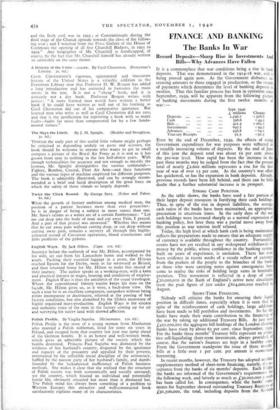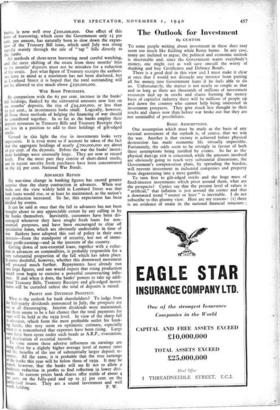Record Deposits—Sharp Rise in Investments And Bills—Why Advances Have Fallen
IT is a commonplace that war conditions bring a rise in bank deposits. That was demonstrated in the 1914-18 war, and is being proved again now. As the Government disburses in- creasing amounts to those engaged in production, so the stream of payments which determines the level of banking deposits is swollen. That this familiar process has been in operation since September, 1939, will be apparent from the following picture of banking movements during the first twelve months of war :— Sept. 1940 £ millions
Change
Deposits ...
2,596.7 +318.6
Cash
398.6 +44.5
Bills ...
401.3 +165.1
Investments
697.1 +94.2
Advances ... 936.8
—74.1
Treasury Receipts 91.5 +91.5
Even by the end of December, 1939, the effects of rising Government expenditure for war purposes were reflected in a steadily increasing volume of deposits. By the end of June of this year the deposit total was about 10 per cent above the pre-war level. How rapid has been the increase in the past three months may be judged from the fact that the present total of nearly £2,600 millions represents a rise for the first year of war of over 15 per cent. As the country's war effort has quickened, so has the expansion in bank deposits. Already, previous records have been left behind, and there can be little doubt that a further substantial increase is in prospect.
STRONG CASH POSITION.
As the table shows, the banks have used a fair portion of their larger deposit resources in fortifying their cash holdings. Thus, in spite of the rise in deposit liabilities, the average cash ratios of the banks have been maintained, an appropriate precaution in uncertain times. In the early days of the war cash holdings were increased sharply as a normal expression of banking policy, but later there was a partial move away from this position as war tension itself relaxed. Today, the high level at which bank cash is being maintained reflects the preparations made to ensure that an adequate supply of currency is available throughout the country. Fortunately, events have not yet resulted in any widespread withdrawals of money by the public, whose confidence in the banking system, built on years of experience, is unshaken. There has even been evidence in recent weeks of a steady reflow of currency from the pockets of the people to the branches of the banks as those who were carrying notes against emergencies have come to realise the risks of holding large sums in bombable premises. This movement is reflected in a drop of some £20,000,000 in the Bank of England's active note circulation from the peak figure of just under L614,000,000 reached in August.
SHORT-TERM FINANCING.
Nobody will criticise the banks for ensuring their liquid position in difficult times, especially when it is seen that in spite of the reinforcement of cash holdings, large additions have been made to bill portfolios and investments. So far the banks have made their main contribution to the financing of the war by taking up additional Treasury Bills. At just over L401,000,000 the aggregate bill holdings of the London clearing banks have risen by about 65 per cent. since September, 1939- For the banks three months' Treasury bills represent an attrac- tive self-liquidating short-term investment, always provided, of course, that the nation's finances are kept in a healthy state. From the Government standpoint the issue of three months bills at a little over I per cent. per annum is economical borrowing. In recent months, however, the Treasury has adopted another supplementary method of short-term financing, namely, the ac- ceptance from the banks of six months' deposits. Each Friday the banks are informed_ of the Government's requirements for the following week, and latterly as much as L30,000,000 a week has been called for. In consequence, while the banks' state- ments for September showed outstanding Treasury Receipts of £91,500,000, the total, including deposits from the Scottish banks, is now well over £200,000,000. One effect of this form of borrowing, which costs the Government only ic per cent. per annum, has naturally been to slow down the expan- sion of the Treasury Bill issue, which until July was rising rapidly mainly through the sale of " tap " bills directly to the banks.
All methods of short-term borrowing need careful watching, and the mere shifting of the strain from three months' bills to six months' deposits must not be mistaken for a reduction of the strain. Just what figure of Treasury receipts the authori- ties have in mind as a maximum has not been disclosed, but in Lombard Street it is hoped that the total outstanding will not be allowed to rise much above £250,000,000.
WAR BOND PURCHASES.
By comparison with the 65 per cent. increase in the banks' bill holdings, flanked by the substantial amounts now lent on six months' deposits, the rise of £94,200,000, or less than to per cent., in investments looks small. Logically, however, all these three methods of helping the financing of war should be considered together. In so far. as the banks employ their deposit resources in Treasury Bills and Treasury Receipts they are less in a position to add to their holdings of gilt-edged stocks.
Viewed in this light the rise in investments looks very impressive. It is even more so if account be taken of the fact that the aggregate holdings of nearly £700,000,000 are about 28 per cent. of the deposits. Before the war the banks' invest- ment holdings were unusually large. They are now at record levels. For the most part they consist of short-dated stocks, and in recent months fresh purchases have been concentrated on the 2.} per cent. National War Bonds.
ADVANCES REPAID
No war-time change in banking figures has caused greater surprise than the sharp contraction in advances. When war broke out the view widely held in Lombard Street was that bank loans would rise, or at least be maintained, as the nation's war production increased. So far, this expectation has been falsified by events.
It can be said at once that the fall in advances has not been brought about to any appreciable extent by any calling in by the banks themselves. Inevitably, customers have been dis- couraged whenever they have sought fresh loans for non- essential purposes, and have been encouraged to clear off speculative loans, which are obviously undesirable in time of war. Bankers have adopted this sort of policy in their own interests—from the standpoint of security, but not of imme- diate profit-earning—and in the interests of the country.
Cutting down of non-essential loans, together with a reduc- tion in advances on commodities, is probably responsible for a very substantial proportion of the fall which has taken place. It seems doubtful, however, whether this downward movement will proceed much further. Repayments have already run into large figures, and one would expect that rising production would soon begin to exercise a powerful counteracting influ- ence. If and when it does, the banks' powers to take up addi- tional Treasury Bills, Treasury Receipts and gilt-edged invest- ments will be curtailed unless the total of deposits is raised.
PROFIT AND DIVIDEND PROSPECT.
What is the outlook for bank shareholders? To judge from the half-yearly dividends announced in July, the prospects are not at all discouraging. Interim dividends were maintained, and there seems to be a fair chance that the total payments for 1940 will be held at the 1939 level. In view of the sharp fall in advances, which form the most profitable outlet for bank- ing funds, this may seem an optimistic estimate, especially when it is remembered that expenses have been rising. Large stuns have been spent under such heads as A.R.P., evacuation, and duplication of essential records. T. 0 some extent these adverse influences on earnings are being offset by a slightly higher average level of money rates and the. benefits of the use of substantially larger deposit re- sources. All the same, it is probable that the true earnings of the banks this year will be below those of 1939. It may be hoped, hcwever, that the banks will see fit not to allow a erate reduction in profits to find reflection in lower divi- ends. At current prices bank shares offer yields of about 4 cent. on the fully-paid and up to 51 per cent. on the Y-paid issues. They are a sound investment and well







































 Previous page
Previous page